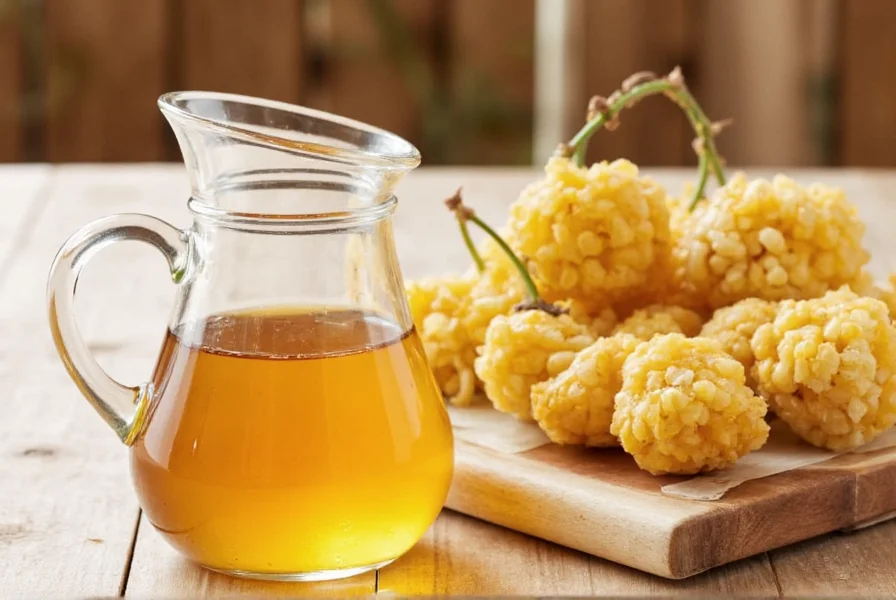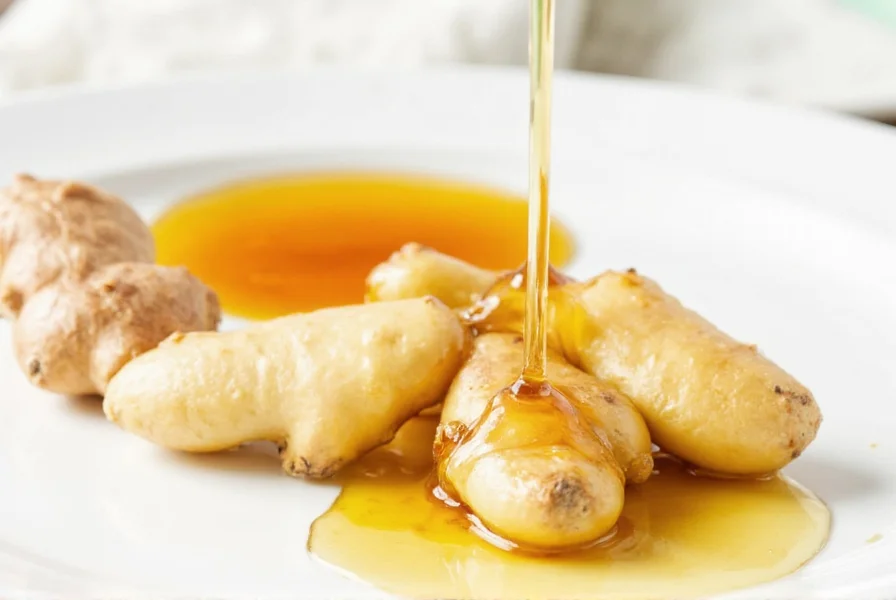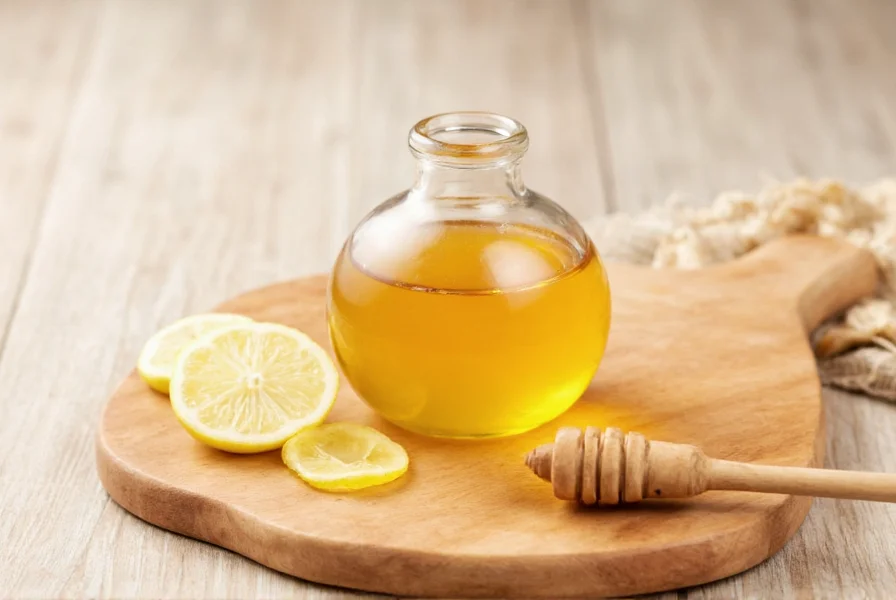For centuries, cultures worldwide have relied on the powerful combination of ginger and honey to address seasonal wellness challenges. Modern research continues to validate many traditional uses of this dynamic duo, revealing scientific backing for its therapeutic potential. Unlike commercial cough syrups filled with artificial ingredients, homemade honey ginger syrup provides a pure, natural alternative that you can prepare in minutes with just two core ingredients.
The Science Behind Honey Ginger Syrup Benefits
Ginger contains gingerols and shogaols, bioactive compounds with demonstrated anti-inflammatory and antioxidant effects. A 2021 review in Nutrients highlighted ginger's effectiveness in reducing nausea and supporting digestive health. Honey, particularly raw varieties, contains hydrogen peroxide and polyphenols that contribute to its antimicrobial properties. When combined in syrup form, these ingredients create a synergistic effect that enhances their individual benefits.
Unlike processed remedies, properly prepared honey ginger syrup maintains the integrity of these compounds through gentle preparation methods. The low-heat extraction process preserves ginger's volatile oils while allowing honey to act as both a natural preservative and delivery mechanism for the active components.
Simple Homemade Honey Ginger Syrup Recipe
Creating effective honey ginger syrup requires attention to ingredient quality and preparation technique. Follow this science-backed method for optimal results:
- Peel and thinly slice 4 ounces of fresh organic ginger root
- Add ginger to 2 cups of filtered water and simmer gently for 30 minutes
- Cool the ginger tea to below 110°F (43°C) to preserve honey's beneficial enzymes
- Mix equal parts cooled ginger tea and raw honey (typically 1 cup each)
- Store in airtight glass container in the refrigerator
This preparation method maximizes the extraction of ginger's active compounds while maintaining honey's natural properties. Avoid boiling the honey directly, as temperatures above 140°F degrade its beneficial components.
| Ingredient Ratio | Best For | Shelf Life |
|---|---|---|
| 1:1 ginger tea to honey | Daily immune support | 2-3 weeks refrigerated |
| 2:1 ginger tea to honey | Acute symptom relief | 1-2 weeks refrigerated |
| 1:2 ginger tea to honey | Mild flavor preference | 3-4 weeks refrigerated |
Practical Applications and Usage Guidelines
Honey ginger syrup serves multiple purposes beyond simple symptom relief. Understanding proper application enhances its effectiveness:
Daily Wellness Maintenance
For immune support during cold and flu season, take 1 teaspoon daily. This preventive approach leverages ginger's immunomodulatory effects and honey's prebiotic properties to strengthen your body's natural defenses. Many users report fewer seasonal wellness challenges when incorporating this simple routine.
Targeted Symptom Relief
When experiencing throat discomfort or respiratory symptoms, increase to 1 tablespoon every 2-3 hours as needed. The syrup coats irritated tissues while delivering active compounds directly to affected areas. Research published in Complementary Therapies in Medicine demonstrated ginger's effectiveness in reducing throat inflammation.
Culinary Applications
Beyond medicinal uses, honey ginger syrup enhances beverages and dishes. Add to herbal teas, drizzle over oatmeal, or incorporate into salad dressings. The natural sweetness and spicy warmth complement both sweet and savory preparations, making it a versatile kitchen staple.

Storage and Safety Considerations
Proper storage maintains potency and prevents spoilage. Always use clean utensils when handling the syrup to avoid contamination. Refrigeration extends shelf life significantly compared to room temperature storage. Discard if you notice any mold, off odors, or fermentation signs.
Important safety notes:
- Never give honey-based products to children under 12 months due to botulism risk
- Those with ginger allergies should avoid this preparation
- Diabetics should monitor intake due to natural sugar content
- Consult your healthcare provider if taking blood thinners, as ginger may interact
Maximizing Benefits Through Quality Ingredients
The efficacy of your homemade honey ginger syrup depends significantly on ingredient quality. Organic ginger root typically contains higher concentrations of active compounds than conventionally grown varieties. Similarly, raw, unfiltered honey preserves beneficial enzymes and pollen that processed honey lacks.
When selecting ginger, look for firm roots with smooth skin and minimal wrinkles. Freshly grated ginger provides more potent flavor and therapeutic compounds than powdered alternatives. For honey, choose local varieties when possible to support regional ecosystems and potentially address local seasonal challenges.

Traditional Wisdom Meets Modern Understanding
While traditional preparations of ginger and honey date back centuries, contemporary research continues to validate their combined benefits. Studies examining ginger's antiemetic properties and honey's wound-healing capabilities demonstrate why this simple preparation has endured across cultures. The syrup format creates a stable delivery system that preserves these benefits while providing convenient usage.
Unlike commercial products that often contain artificial flavors, colors, and preservatives, homemade honey ginger syrup offers a pure alternative that you control. This transparency in ingredients provides peace of mind while delivering genuine therapeutic value.
Frequently Asked Questions
How long does homemade honey ginger syrup last?
Properly prepared and stored in a clean, airtight container in the refrigerator, honey ginger syrup maintains quality for 2-3 weeks. The natural preservative qualities of honey extend shelf life, but always check for signs of spoilage like mold, fermentation bubbles, or off odors before use.
Can I use this syrup for children's coughs?
Honey ginger syrup can help soothe coughs in children over 1 year old. The American Academy of Pediatrics recognizes honey as an effective cough remedy for this age group. However, never give honey-based products to infants under 12 months due to the risk of infant botulism. For young children, reduce the dosage to 1/2 teaspoon and consult your pediatrician if symptoms persist.
Does honey ginger syrup help with digestion?
Yes, both ginger and honey support digestive health. Ginger stimulates digestive enzymes and accelerates gastric emptying, while honey's prebiotic properties nourish beneficial gut bacteria. Taking 1 teaspoon of honey ginger syrup 15-20 minutes before meals can help prepare your digestive system, potentially reducing bloating and discomfort. Research in the World Journal of Gastroenterology confirms ginger's effectiveness for functional dyspepsia.
Can I make this syrup without heating the honey?
Absolutely, and this method preserves more of honey's beneficial compounds. Instead of mixing with hot tea, prepare ginger tea and cool it completely before adding honey. Some enthusiasts even use room temperature water with grated ginger steeped for 24-48 hours, then strain and mix with honey. This cold-infusion method maintains all enzymatic activity in the honey while still extracting ginger's beneficial compounds.
How does honey ginger syrup compare to commercial cough medicines?
Unlike many commercial cough syrups containing dextromethorphan, antihistamines, or artificial ingredients, honey ginger syrup offers a natural alternative with fewer potential side effects. Research published in JAMA Pediatrics found honey more effective than common cough suppressants for nighttime symptom relief. The syrup works by coating irritated tissues and providing anti-inflammatory compounds rather than suppressing the cough reflex, supporting your body's natural healing process.











 浙公网安备
33010002000092号
浙公网安备
33010002000092号 浙B2-20120091-4
浙B2-20120091-4